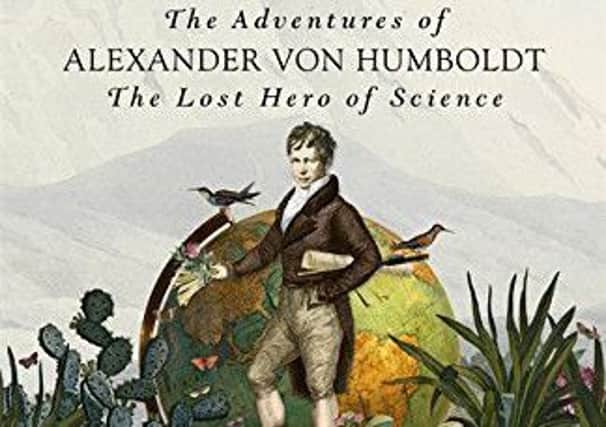Book review: The Invention of Nature by Andrea Wulf


The Invention of Nature: The Adventures of Alexander von Humboldt, The Lost Hero of Science by Andrea Wulf | John Murray, 473pp, £25
There’s something very organic about the way societies transmit knowledge and develop ideas. The stereotype of the eccentric academic genius working away in isolation in his ivory tower is a nonsense; instead, the greatest leaps in our understanding seem to happen when great thinkers start talking to each other. Over time, these little clusters of information exchange gradually link up with each other to form huge, complex intellectual ecosystems – and only then do we get, say, Darwin’s theory of evolution.
Advertisement
Hide AdThe great unfairness, of course, is that the key players in developing the ecosystems from which such great ideas spring aren’t always the ones whose names echo down the ages. We all know who Darwin was because he came up with that memorable line about us all being descended from apes, but, as he himself would readily have admitted, the great man would never have arrived at his great theory had it not been for the very considerable influence of Alexander von Humboldt.
Born into an aristocratic Prussian family in 1769, in his day Humboldt was so revered by the scientific community of Europe that scholars would travel half way across the contient just to hear him speak. Darwin was such a fan that, before setting sail on the Beagle, he wrote to the captain to double-check there would be enough room in his cramped cabin for his complete, seven-volume set of Humboldt’s Personal Narrative – his account of his travels in Latin America. As Andrea Wulf observes in this luminously written biography, “Throughout the Beagle’s voyage, Darwin was engaged in an inner dialogue with Humboldt,” not just reading and re-reading his Personal Narrative, but also getting his brother to send him copies of Humboldt’s latest publications so he could keep abreast of how his hero’s ideas were developing.
As a boy, Humboldt had always yearned to travel, but his conservative mother had constantly frustrated his ambitions, insisting he get a respectable job in Prussia. This he duly did, graduating from the mining academy in Freiberg in record time and ascending to the lofty rank of mining inspector at the age of just 22. It was during this period that he came into contact with Goethe, and it was Goethe, rather than any scientific mentor, who was to give him his great, defining insight: the idea that the natural world functioned as a unified whole. It was this ability always to see the bigger picture, at a time when most scientists were trying to examine things in increasingly minute detail, that made Humboldt unique among his contemporaries. It meant that, when he finally got to go on his big adventure to South America in 1799 following the death of his mother, he was able turn the experience of climbing almost to the summit of the mighty Chimborazo, then thought to be the highest mountain in the world, into the concept of Naturgemalde – an untranslatable German term that broadly means a sense of unity in nature. “Nature is a living whole” he wrote, and to illustrate his point he produced a huge, three-foot by two-foot drawing of Chimborazo, showing how factors like temperature and humidy at different altitudes related to the flora and fauna on the ground. At a stroke, he had revolutionised the way we look at the links between vegetation and climate in a manner that still shapes our understanding of ecosystems today. His other great breakthroughs are too numerous to list here, but, just as his work in South America influenced Darwin (not to mention Henry David Thoreau, whose Walden, Wulf points out, was completely re-written after its author read Humboldt) so his dire warnings about man’s ability to damage nature deeply influenced early environmentalists like John Muir and George Perkins Marsh.
Given the magnitude of his influence, why Humboldt isn’t a household name today is a mystery, and one for which Wulf offers no explanation. On the evidence of this wonderful book, however, he should be hastily added to every school syllabus in the land.